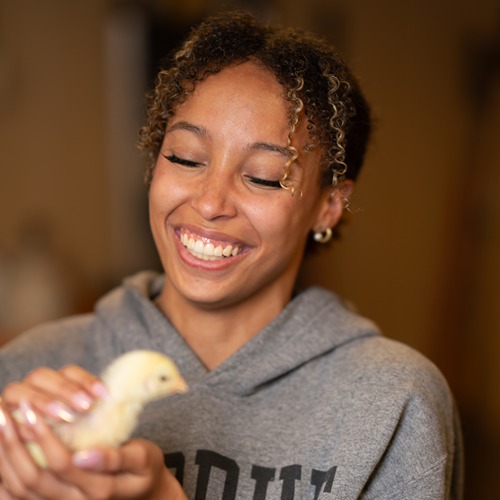Purdue professors to develop course on agriculture informatics for agriscience students
A multidisciplinary team from Purdue University, under the leadership of Dharmendra Saraswat, a professor in the Department of Agricultural and Biological Engineering, recently received funding from the Higher Education Challenge Grants Program of the U.S. Department of Agriculture National Institute of Food and Agriculture (NIFA). The team will develop a curriculum to inculcate computational thinking, teach software development skill sets and increase agriscience students’ competencies for agriculture informatics careers.

The co-project directors are Dennis Buckmaster, Ankita Raturi, and Somali Chaterji, professors in the Department of Agricultural and Biological Engineering (ABE); James Krogmeier and Aaron Ault in the Department of Electrical and Computer Engineering (ECE); Neil Knobloch in the Department of Agricultural Sciences Education and Communication (ASEC); and Mark Daniel Ward in the Department of Statistics.
“This is a great win for Dr. Saraswat and his team of faculty at Purdue researching and teaching in digital agriculture,” Buckmaster said. “The Open Ag Technology and Systems Center has been training students in related areas, but this extends our reach by institutionalizing additional curricula with key collaborations with well-chosen colleagues in other institutions.”
Purdue’s project team will collaborate with the University of Kentucky and Tuskegee University to develop and introduce new courses on agriculture informatics to these campuses.
“A major goal of this project is enabling the project team to develop two-week course modules that will be integrated into 12 existing courses,” Saraswat said. “In addition, three new semester-long courses on agriculture informatics will be developed. They can be taken in sequence by both undergraduate and graduate students.”
The newly developed courses will use problem-based learning and the inverted classroom approach for active student participation. Communication, team building, leadership and independent learning will be emphasized throughout. The educational content will be made available to other land-grant universities and industry for wider use.
Another major focus of the project is to create a collaborative environment and cultivate open-source communities in agriculture beyond the proposed courses through experiential learning, professional development experiences and publication of open-source videos, libraries, code and course materials.
The project is expected to promote teamwork among agriscience students, increase their networks and enhance readiness for agriculture informatics careers.
“Over 1,300 undergraduate and graduate students will be impacted over the three-year grant period by participating in two-week course modules and enrolling in three new courses,” Saraswat said. “They will learn experientially through participation in data-thons, an online data symposium and internships.”
The work complements recent Purdue curricular developments, including the “Applications in Data Science” undergraduate certificate program, an undergraduate minor in Data-Driven Agriculture and a graduate certificate in Spatial Data Science. The work additionally supplements The Data Mine efforts for undergraduate instructions at Purdue and REEU Data Science for Agriculture, a USDA/NIFA funded summer experiential research program.






